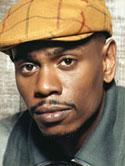This rising black comedian of TV and films has been impressive in his own short-lived TV series "Buddies" (ABC, 1996), and as the comic who is the butt of Eddie Murphy's wrath in "The Nutty Professor" (1996). The son of a Unitarian minister, Dave Chappelle began performing in comedy clubs in his native Washington, DC, at age 14. Within a year, he got a big change--a slot on stage at the famed Apollo Theatre in Harlem, but his performance was met with booing. Still he persevered and became a hit in clubs on the East Coast.
By 1992, the wiry, energetic comedian was gaining national exposure with appearance on "Russell Simmons' Def Comedy Jam" (HBO) and "Six Comics in Search of a Generation" (Lifetime). Sponsored by co-host Whoopi Goldberg, Chappelle appeared on the 1994 HBO special, "Comic Relief VI"; at age 20, he was also said to be the youngest comic to have a featured spot. He followed with a guest appearance on ABC's "Home Improvement" in 1995, which was a pilot for a proposed spin-off sitcom. "Buddies", a Disney-produced show that premiered in 1996, teamed Chappelle with the very un-comic Christopher Gartin in a black-white pairing. Despite the quick cancellation of the series, Disney was impressed enough with the ascendant star to offer him a $1 million development deal.Chappelle broke into features in the uneven Mel Brooks' spoof "Robin Hood: Men in Tights" But it was his turn in "The Nutty Professor" that clinched his screen viability. He went on to a featured role as a wisecracking convict in the box-office success "Con Air" (1997) and was teamed with Tommy Davidson in "Woo" (1998). In an attempt to pay homage to Cheech and Chong, Chappelle wrote and starred in the marijuana comedy "Half Baked" (1998), then lent his distinctive, affable charm to supporting roles in "You've Got Mail" (1998), "200 Cigarettes" (1999) and "Blue Streak" (1999) before reviving his pot-head persona for the dismal revenge comedy "Screwed" (2000) opposite his off-screen friend Norm MacDonald. In the Eddie Griffin blaxplotiation comedy "Undercover Brother" (2002), Chappelle showed his edgier side as the paranoid, white-suscpicious Conspiracy Brother, a taste of the more sharply pointed, politicaly incorrect comedy that characterized his stand-up.After a 2002 stint as one of the many caller voices on Comedy Central's muppet-y prank call show "Crank Yankers," Chappelle inked a pact with the cable network to write, produce, host and star in his own half-hour sketch comedy series, "Chappelle's Show" (2003 - ). Chappelle made the most of the creative freedom the series allowed, and quickly delivered a show that reflected his sensibilities: hip, edgy and frequently racially, sexually and scatalogically charged; outrageous but rarely offensive due to its intelligence, sharp observations and easygoing humor. Over two 13-episode seasons "Chappelle's Show" quickly garnered a loyal viewership addicted to over-the-top recurring characters like crackhead Tyrone Biggums and Negrodamus, scathing parodies of Rick James, Prince, rapper Lil' John and "The Real World" and wild catch phrases ("I'm rich, beeyotch!"), as well as landing several Emmy nominations. In 2004 Comedy Central signed Chappelle to a $50 million contract for two more seasons, and the comedian was also poised to return to feature films with projects tailored especially to his newly appreciated talents.However, things quickly spiraled wildly and unpredicatably out of control in the spring of 2005 when, after Chappelle reportedly taped nearly five episodes of his series' third season following a several-month delay due to an undisclosed illness, he became a no-show on the set for several days, prompting Comedy Central to halt production and announce that the comedy would not meet its anticipated May 31 launch. Days after the announcement, it was reported by Entertainment Weekly that Chappelle had flown from Newark, New Jersey, to Capetown, South Africa, on Apr. 28 and voluntarily checked himself into an unnamed psychiatric facility for treatment. Various theories were floated for the comic's apparent meltdown, including creative differences with the cable network over his series' envelope-pushing content, an inability to cope with his overwhelming success and an increased use of recreational drugs (long a staple of his on-screen persona). However, Chappelle insisted that he had merely embarked an a "spiritual retreat" in the wake of continuing creative frustrations and stress resulting from his Hollywood success, denying any drug use and saying that he had only had a 40-minute session with a psychiatrist while staying with friends in Durban in 2006 Chappelle told Oprah Winfrey he'd consider returning to his TV show if Comedy Central meets certain conditions. "I felt in a lot of instances I was deliberately being put through stress," Chappelle said.
MyspaceDaddy.com - Myspace Codes
